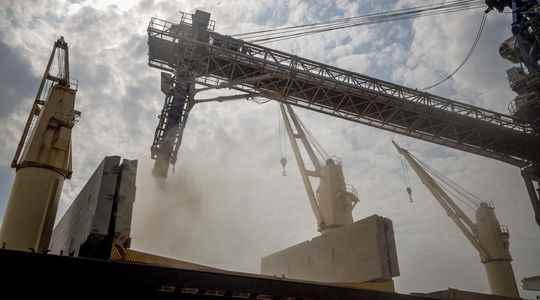The threat, maintained by a Vladimir Putin making the question of wheat a geopolitical game, hovered for several weeks over the Black Sea agreement. This commitment, carried by the United Nations and overseen by Turkey, was signed on July 22 after months of blockage and weeks of negotiation. Since the start of the invasion of Ukraine at the end of February, agricultural products and cereals have been dormant in the ports of the south of the country, posing a serious risk of a food crisis, in particular for the countries of North Africa and Asia dependent on these exports. “Ukraine produces a lot of corn, barley and sunflower oil. These products contribute to the balance of the world food market since they are consumed by almost all the countries on the planet. With the war, the end of Ukrainian exports has had consequences on soaring prices and supply difficulties”, explains to L’Express Sébastien Abis, researcher at Iris and specialist in agricultural economic issues. The effect of the agreement signed in mid-summer was therefore immediate.
In the space of three months, it made it possible to export more than 9 million tons of cereals and agricultural products. On Saturday October 29, the Kremlin broke the calm that was gradually returning to international markets by announcing its withdrawal from the agreement after a drone attack in the port of Sevastopol, in Crimea, the same morning. A justification that does not pass with the Ukrainian government. The Minister of Foreign Affairs, Dmytro Kouleba, evoked “a false pretext” to break an engagement that Russia had already denounced for several weeks.
Successive reviews
From September 29, nine weeks after the signing of the agreement, the spokeswoman for the Ministry of Foreign Affairs, Maria Zakharova, called for a redefinition of the text. This is the first time that a Kremlin official has used this narrative. “We expect the UN to make efforts to induce Europeans and Americans to remove a number of obstacles that prevent us from fully supplying Russian fertilizers and cereals to the world market.” It is taken up again the following weeks, Moscow considering itself increasingly aggrieved.
The Russian inability to regain the European market, barred by sanctions, is undermining the country’s economy, confirms Carole Grimaud, founder of the think tank, Center for Russia and Eastern Europe Research (CREER) and specialist in Russian geopolitics. “Ships cannot enter European ports and waters. Russian cereals and fertilizers are partly blocked,” she explains.
The reproach addressed to the Europeans is therefore widely repeated by the heavyweights of the regime. It is all the easier to do so as it is added to the long list of grievances against Westerners. Shortly before the announcement of the suspension of the grain agreement, the Russian Minister of Agriculture had once again criticized the text. On television on Friday, he accused members of the European Union of appropriating exports reserved for poor countries. To the latter, Dmitri Patrushev promised to deliver up to 500,000 tons of Russian cereals free of charge.
Geopolitics of cereals
“Russia is seeking to pursue a strategy of chaos by putting world food under pressure, which allows it to open and close the tap as it did with gas, and thus monetize its supporters, underlines Sébastien Abis. Russia is “geopoliticizing” the grain markets in a way. It is playing on its ability to feed the world with wheat to redraw alliances.” According to forecasts, 100 million tonnes of Russian wheat will be produced in 2022. Getting out of the agreement seems to be the way to disrupt a sector that was beginning to regain pre-invasion reflexes.
The gradual return of Ukrainian exports should rather rebalance the price of agricultural products. Russia, which represents a quarter of the sector, has little interest in seeing prices start to fall again, points out Elena Neroba, analyst for Maxigrain, a Ukrainian cereal import-export company. “They say that Ukraine is not respecting the agreement well. It is rather that the Russians are in difficulty. They are trying to create new obstacles to Ukrainian exports since since the opening of the corridor on July 22, the Ukraine has increased its exports,” she notes.
“It’s a means of pressure to lift Western sanctions”
While Ukraine has partly managed to circumvent the obstruction of its ports in the south of the country thanks to the FARM initiative, which allows some of the grain produced on its soil to be taken out by land, it remains dependent on the sea route. According to specialist Andrey Sizov, who follows the development of the grain market in the Black Sea, interviewed by Release in early October, the end of the agreement would put an end to 70% of Ukrainian national exports and lead to a further spike in prices. Russia knows it.
Ultimatum and dependency
“It’s a means of pressure to lift Western sanctions, supports Carole Grimaud. The agreement was to be contracted again in mid-November. The Russians issue an ultimatum saying: you have two weeks to lift the export sanctions. of fertilizers and cereals that weigh on us”. However, Russia also knows that some of its interests lie in maintaining this agreement.
The Russian economy is indeed “dependent on its exports”, specifies Sébastien Abis. At the same time, thanks to this mechanism, Russia is displaying to friendly powers its concern for the world’s food balance. And can test the influence of its power with successive countries to join it in its fight against the West. The interest of this agreement is above all diplomatic. “He maintains the hope of a dialogue”, supports Carole Grimaud. Since the first day of the invasion, it has been the only space for negotiation that has led to concrete progress. This Sunday, UN Secretary General Antonio Guterres said he was “deeply concerned” by the Russian withdrawal.
